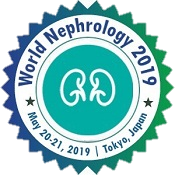
Efrén Alejandro Hernández MartÃnez
Mexican Institute of Social Security, Mexico
Title: Association of adherence to treatment evaluated by the Simplified Medication Adherence Questionnaire (SMAQ) with a history of rejection in pediatric kidney transplant
Biography
Biography: Efrén Alejandro Hernández MartÃnez
Abstract
The lack of adherence to treatment in transplant patients is a direct factor associated with the loss of graft and even death. Amongst the tools to measure adherence to treatment is the Simplified Medication Adherence Questionnaire (SMAQ). SMAQ is a brief and simple instrument, based on questions to the patient about his habit in taking medication, validated to measure adherence in patients with kidney transplant. Multiple studies have been conducted to assess adherence to treatment and the repercussion in rejection in patients with poor adherence, but so far, we do not have any study of this type in Mexico. The National Medical Center of the West (CMNO) has the most number of cases of kidney transplants in pediatric patients in Mexico, for this reason, we considered it pertinent to perform this study in the population of CMNO.
The aim of this study was to determine the association of attachment to treatment measured by the SAMQ in the pediatric patients with a history of rejection to kidney transplantation in our hospital.
We performed transversal analysis in pediatric patients with kidney transplant of the Pediatric Hospital of CMNO. We reviewed the clinical records of the patients that came to follow up on January 2017 and applied the SMAQ to those patients.
A total of 89 questionnaires were applied during the period. The SMAQ showed that patients with functional graft were adhered to the treatment 96.7%, while patients with dysfunctional graft had 50% treatment adherence. Patients without treatment adherence have a higher risk of transplant dysfunction (p<0.001). When adherence to treatment is less than 95%, the risk of graft dysfunction is 39% (p = 0.006), compared to those who show adherence to treatment of 95% or more.
Based on the Simplified Medication Adherence Questionnaire (SMAQ), patients who are not adhered to treatment and those who have adherence to immunosuppressive treatment of less than 95%, have a higher risk of graft dysfunction

